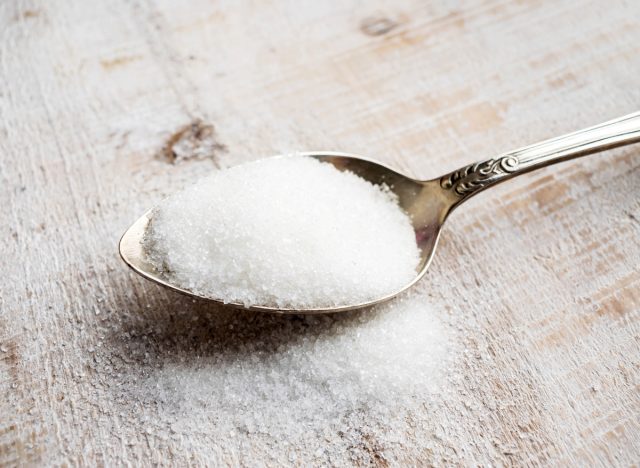Too much of a good thing may end up punching you in the gut. Many people have found that drinking beverages and eating foods made with artificial sweeteners have helped them to reduce calories, lose weight, and control blood sugar.
Recent research, however, suggests that artificial sweeteners like aspartame, saccharin, and sucralose may end up altering our gut microbiome in ways that may negatively impact our health.
More than a dozen animal and human studies in recent years have looked at the health implications of consuming non-nutritive sweeteners. While not showing a definitive cause and effect, many of these studies suggest that artificial sweeteners may throw the gut microbiota out of balance, play a role in glucose intolerance, and even damage the intestinal lining, leading to leaky gut syndrome. To learn how to protect your gut, read This Eating Habit Can Significantly Improve Your Gut Health, Says New Study.


One of the most recent studies published in 2021 in the International Journal of Molecular Sciences demonstrated that three widely-used artificial sweeteners may make two types of gut bacteria harmful to the walls of the intestine.
“Our study is the first to show that some of the sweeteners most commonly found in food and drink—saccharin, sucralose and aspartame—can make ‘healthy’ gut bacteria become pathogenic (disease-causing),” said the senior author of the study Dr. Havovi Chichger, a biomedical scientist at Anglia Ruskin University in the United Kingdom.
READ RELATED: Vikas Kumar Height, Weight, Age, Body Statistics
The research found that artificial sweeteners—in a concentration equivalent to two cans of diet soda—caused two harmful types of gut bacteria, E. coli and E. faecalis, to attach themselves to and damage the epithelial cells that line the walls of the intestine. E faecalis is known to cross the intestinal wall and enter the bloodstream where it can cause infections in lymph nodes and organs, according to Chichger.
“These (pathogenic changes which include greater formation of biofilms and increased adhesion) could lead to our own gut bacteria invading and causing damage to our intestine, which can be linked to infection, sepsis, and multiple-organ failure,” Chichger said.
Despite this and other studies linking artificial sweeteners to potential health risks, the US Food & Drug Administration, after decades of study, has determined that all three sweeteners are safe for human consumption. To learn more read What Are Artificial Sweeteners? And Why They’re in Your Food.
Jeff Csatari
editing Galvanized Media books and magazines and for advising journalism
students through the Zinczenko New Media Center at Moravian University in Bethlehem, PA. Read more
Source:










